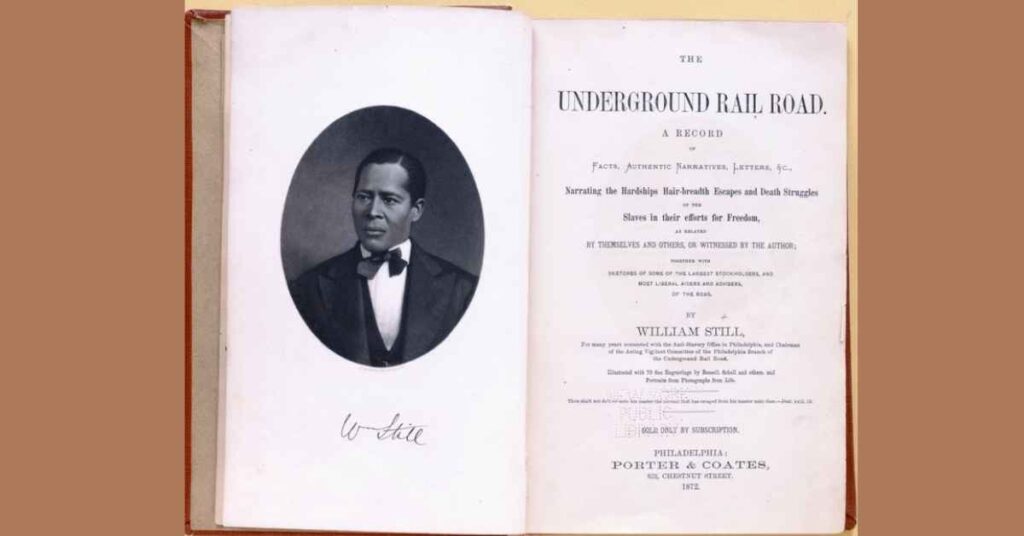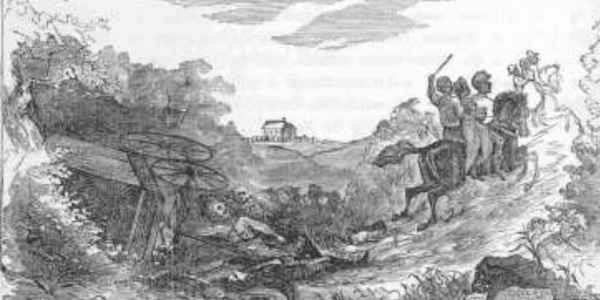This excerpt from “The Underground Railroad” by William Still documents a party of six fugitives who escaped from Hagerland, Maryland by stealing their owner’s wagon and horses.
They were accosted on the road by two white men whose carriage had brown down and wanted to seize theirs. The fugitives fought back with clubs and got away on the horses.
The escaping party included:
- Charles Bird
- George Dorsey, a friend of Charles
- Angeline Brown (sister of George) and her sons Albert and Charles
- Jane Scott, a friend of Angeline
About The Book
“The Underground Railroad” was published in 1872. The book gives the testimonies of hundreds of slaves who escaped to freedom using the network of agents and safe houses.
The author, William Still, was a black abolitionist and businessman who was a key member of the Philadelphia stop in the freedom network.
The book is in the public domain. It can be found in the Library of Congress.
Any headings and italicized text in the excerpt below were added by the website editor. The rest is nearly verbatim from the book. However, I changed the order of some sections to make the narrative clearer. There are also some changes to the punctuation.

Excerpt – Escape Of A Party Of Six
This party in order to get over the road as expeditiously as possible, availed themselves of their master’s horses and wagon and moved off civilly and respectably.
About nine miles from home on the road, a couple of white men, finding their carriage broken down approached them, unceremoniously seized the horses by the reins and were evidently about to assume authority, supposing that the boys would surrender at once.
But instead of so doing, the boys struck away at them with all their might, with their large clubs, not even waiting to hear what these superior individuals wanted.
The effect of the clubs brought them prostrate in the road, in an attitude resembling two men dreaming, (it was in the night.)
Switching To Horseback
The victorious passengers, seeing that the smashed up carriage could be of no further use to them, quickly conceived the idea of unhitching and attempting further pursuit on horseback.
Each horse was required to carry three passengers. So up they mounted and off they galloped with the horses’ heads turned directly towards Pennsylvania.
No further difficulty presented itself until after they had traveled some forty miles. Here the poor horses broke down, and had to be abandoned.

Arrival To Safety
The fugitives were hopeful, but of the difficulties ahead they wot not; surely no flowery beds of ease awaited them.
For one whole week they were obliged to fare as they could, out in the woods, over the mountains, &c.
How they overcame the trials in this situation we cannot undertake to describe.
Suffice it to say, at the end of the time above mentioned they managed to reach Harrisburg and found assistance as already intimated.
About Charles Bird
Charles was twenty-four years of age, quite dark, of quick motion, and ready speech, and in every way appearing as though he could take care of himself.
He had occupied the condition of a farm laborer.
This calling he concluded to forsake, not because he disliked farming, but simply to get rid of David Clargart, who professed to own him, and compelled him to work without pay, “for nothing.”
While Charles spoke favorably of Clargart as a man, to the extent, at all events, of testifying that he was not what was called a hard man, nevertheless Charles was so decidedly opposed to Slavery that he felt compelled to look out for himself.
Serving another man on the no pay principle, at the same time liable to be flogged, and sold at the pleasure of another, Charles felt was worse than heathenish viewed in any light whatsoever.
He was prepared therefore, to leave without delay. He had four sisters in the hands of Clargart, but what could he do for them but leave them to Providence.
About George Dorsey
The next on the list was George Dorsey, a comrade of Charles.
He was a young man, of medium size, mixed blood, intelligent, and a brave fellow as will appear presently.
About Angeline Brown And Her Sons
George [Dorsey] and Angeline, (who was his sister) with her two boys [Albert and Charles] had a considerable amount of white blood in their veins.
[They] belonged to a wealthy man by the name of George Schaeffer, who was in the milling business.
They were of one mind in representing him as a hard man. “He would often threaten to sell, and was very hard to please.”
George and Angeline left their mother and ten brothers and sisters.
About Jane Scott
Jane was a well-grown girl, smart, and not bad-looking, with a fine brown skin, and was also owned by Schaeffer.
Other Fugitives Who Escaped With Their Masters’ Horses
This enterprising six weren’t the only fugitives in William Still’s book who absconded with the helpful aid of the horses and wagons of their owners.
A group of four did the same and were also accosted. In this case, the fugitives were armed with guns and drew them to make good their escape.
One young man took his master’s horse and posed as a coachman to a white woman who aided his escape.